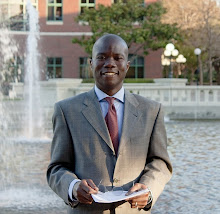The Governator goes back to his roots as a reformer.
'California is so broken that we must look at every bold proposal out there, no matter how daring or radical -- including the idea of a flat tax."
-- Arnold Schwarzenegger, June 11, 2009
Now we're getting somewhere. Having had his grand budget deal repudiated by the voters, and facing a $24.3 billion deficit only six months after raising taxes to close a $40 billion deficit, California's Governor is going back to his roots as a reformer.
Mr. Schwarzenegger has shocked nearly everyone in Sacramento by embracing some seismic policy changes to fix the California budget for the long term. These reforms include a flat-rate income tax, a spending limitation measure with teeth, and deep cuts in wasteful spending. Yesterday he declared that he won't sign another tax increase and he will no longer allow the state to issue new short-term debt to punt its budget problems down the road. He even told the liberal Democrats who run the legislature that if they're not ready to make cuts, get ready for a long hot summer that may end in "a shutdown of all the funding -- a grind to the halt" in government.
Mr. Schwarzenegger has called for cutbacks even in education, Medicaid, prisons and pensions, heretofore the sacred cows of state politics. And why not? That's where three-quarters of the money goes and the dollars are buying far too little in results. The state has the highest teacher salaries in the nation, but the second lowest math and reading test scores, according to U.S. Department of Education data. The state spends $49,000 per prison inmate, or 50% more per criminal than the average state.
"Other states have privately run correctional facilities," notes Mr. Schwarzenegger. "Why not California?" Good question. The Governor also wants to eliminate and consolidate scores of mostly useless boards and panels -- such as the $1.2 million blueberry commission -- that exist mostly for political patronage.
The best idea is his semi-endorsement of a flat tax for California. The state's budget problem has two main causes: The first is runaway spending and the second is a tax structure that smothers businesses and entrepreneurs. California's income tax is the most progressive of all 50 states, with the second highest top rate (10.55%) after New York City's 12.62%. The Governor's revenue office calculates that between 50% and 55% of the income tax in the state comes from Kobe Bryant and the rest of the richest 1% of taxpayers.
This sounds like a liberal's tax paradise, but the "soak the rich" system has imploded on itself. As tax rates keep rising, more Californians move to places like Nevada and Texas where they can pay zero income tax, leaving Sacramento with fewer revenue sources. Moreover, the progressive rate structure means that California experiences more extreme gyrations in its revenues than any other state.
The nearby chart shows how state tax revenues rise and fall more excessively than does state personal income. From 2003 to 2008, state revenues boomed by 40% as the economy expanded. But in the last year, revenues have fallen by more than 20%. Politicians in Sacramento pile on new spending in the boom years, building in new pension and other commitments that are unsustainable in the downturns. The interest groups furiously oppose any spending decline, so the politicians dutifully raise taxes, and the cycle repeats.
Mr. Schwarzenegger has appointed a bipartisan tax reform commission and it is exploring a "uniform tax" with a rate of 6% on individuals and corporations with few deductions. This would raise enough revenue to run the government while reducing the sharp revenue shifts from boom to bust and back. More important, it is the kind of tax overhaul that could start to attract business back to the state.
None of this will be easy to pass, but Mr. Schwarzenegger has everything to gain for his state and his reputation. His term ends in 2010 and he's not running for re-election. The state's economy can't prosper under its current burdens, and voters have resoundingly rejected tax-and-spend-as-usual. Arnold became Governor on the promise of reform, and in his final months he once again has a chance to make good on that promise.
Printed in The Wall Street Journal, page A14
Subscribe to:
Post Comments (Atom)

No comments:
Post a Comment